|
|
|
Sort Order |
|
|
|
Items / Page
|
|
|
|
|
|
|
| Srl | Item |
| 1 |
ID:
162769
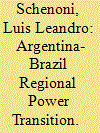

|
|
|
|
|
| Summary/Abstract |
Almost four decades have passed since the Argentina-Brazil balance of power gave way to a Brazilian uncontested primacy in the Southern Cone. The peaceful and cooperative nature of this regional power transition poses an interesting puzzle for structural theories and those concerned with the US-China transition. Why do certain countries accept accommodation more leniently, like Argentina did? I offer an explanatory model and use process tracing to show that key cooperative turns in this bilateral relationship—during the late 1970s and early 1990s—required concurrent structural changes, both at the international and domestic levels. My conclusions suggest, against the prevalent narrative, that cooperation between Argentina and Brazil was not a product of democracy. Instead, peaceful power transitions take place when the costs of confrontation are high and social coalitions are largely redefined in the declining state.
|
|
|
|
|
|
|
|
|
|
|
|
|
|
|
|
| 2 |
ID:
162771
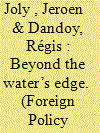

|
|
|
|
|
| Summary/Abstract |
Based on the growing scholarly recognition of domestic influences on foreign policy, political parties are considered to be among the main drivers behind foreign policy in most parliamentary democracies. In order to understand party influences on the governmental foreign policy agenda, we examine what determines the congruence between party manifestos and the ensuing government agreements in Belgium from 1978 to 2008. We find that a combination of variables related to political parties’ negotiation position during government formation and regarding their ideological left-right position co-determine their impact on the content of the coalition agreement in terms of foreign policy priorities. This study shows that political parties differ in their foreign policy priorities and that they compete to see these priorities included in the future government’s policy program.
|
|
|
|
|
|
|
|
|
|
|
|
|
|
|
|
| 3 |
ID:
162774
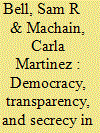

|
|
|
|
|
| Summary/Abstract |
Why is it that some democracies are able to effectively engage in secrecy and mobilize their forces privately, while others are unable to keep enough information secret to effectively carry out such an attack? Recent work by Colaresi (2014) suggests that a democracy's ability to keep information secret depends on its retrospective oversight institutions, which allow democracies to keep information secret in the present with the promise of revealing it to the public in the future. Though Colaresi (2014) finds that states with retrospective oversight have greater military spending, more support for military action, and more success in crises, to our knowledge there has yet to be empirical support for the argument that democracies with greater retrospective oversight can actually conduct foreign policy with greater opacity than those without retrospective oversight. In this research note we empirically explore this question, using data on private mobilizations by democracies with varying levels of retrospective oversight. This gives us greater insight into strategic military choices and shows how military effectiveness can be affected by political institutions.
|
|
|
|
|
|
|
|
|
|
|
|
|
|
|
|
| 4 |
ID:
162772
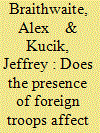

|
|
|
|
|
| Summary/Abstract |
Troops were deployed on an unprecedented scale during the Cold War. Much of the network of deployments established during that time has persisted long after the end of the Cold War. We look to contribute to a growing literature addressing the costs and benefits associated with hosting foreign troops. We ask: Does the presence of foreign troops affect stability in the host country? To answer this question, we develop an argument in which deployed troops are seen as a costly signal of the deploying state’s interest in and commitment to stability in the host country. The presence of foreign troops positively affects the perceived stability of the host country and the robustness of their legal and political institutions. This bolsters the enforcement of agreements between the host government and latent and manifest opposition groups to pursue alternatives to fighting. We test this logic using instrumental variables regressions in which we endogenize deployment motivations. All tests support the expectation that the presence of foreign troops reduces the likelihood of the occurrence of civil conflict in the host state.
|
| Contents |
Troops were deployed on an unprecedented scale during the Cold War. Much of the network of deployments established during that time has persisted long after the end of the Cold War. We look to contribute to a growing literature addressing the costs and benefits associated with hosting foreign troops. We ask: Does the presence of foreign troops affect stability in the host country? To answer this question, we develop an argument in which deployed troops are seen as a costly signal of the deploying state’s interest in and commitment to stability in the host country. The presence of foreign troops positively affects the perceived stability of the host country and the robustness of their legal and political institutions. This bolsters the enforcement of agreements between the host government and latent and manifest opposition groups to pursue alternatives to fighting. We test this logic using instrumental variables regressions in which we endogenize deployment motivations. All tests support the expectation that the presence of foreign troops reduces the likelihood of the occurrence of civil conflict in the host state.
|
|
|
|
|
|
|
|
|
|
|
|
|
|
|
|
| 5 |
ID:
162768


|
|
|
|
|
| Summary/Abstract |
How do domestic politics in the donor country affect foreign aid policy? Scholars have analyzed the impact that political parties and domestic institutions play in shaping aid effort. Building on this previous work, we examine the impact of domestic politics on the channels chosen for aid distribution. In this paper, we explore whether and how the ideological composition of donor governments affects the method of delivering aid to recipient states. Specifically, we argue that more liberal governments are more inclined to provide aid via nongovernmental organizations (NGOs), while more conservative governments prefer to give aid through direct bilateral government-to-government channels. These choices, we argue, reflect the different goals that right and left parties pursue through their allocation of foreign aid. Our results indicate that left governments are more inclined to channel aid through NGOs in an attempt to directly implement poverty alleviation strategies. Alternatively, right wing governments place a greater emphasis on channeling aid through recipient state governments to promote the economic interests of their constituents and the geopolitical interests of the state.
|
|
|
|
|
|
|
|
|
|
|
|
|
|
|
|
| 6 |
ID:
162770
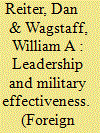

|
|
|
|
|
| Summary/Abstract |
What determines military effectiveness? Though political scientists have studied the sources of military effectiveness, they have generally ignored the role of military leadership, a factor that historians have emphasized as crucial for effectiveness. This article presents the first rigorous examination of the proposition that militaries improve effectiveness by replacing low-performing leaders. The article tests three theories describing how militaries promote and demote leaders: (1) military leaders are promoted and demoted on the basis of combat performance; (2) political leaders fearful of coups do not demote low-performing military leaders, as a coup-proofing tactic; and (3) military leaders that belong to powerful interpersonal networks are less likely to be demoted and more likely to be promoted. Hypotheses are tested using new data on all American and German generals holding combat commands in the North African, Italian, and West European theaters in World War II and new data on the monthly combat performance of American and German divisions in these theaters. Analysis reveals that both armies replaced low-performing generals (coup-proofing motives did not prevent Hitler from demoting low performers) and that interpersonal networks in the US army did not block demotion of low performers. Also, the replacement of low-performing generals improved combat effectiveness in both armies.
|
|
|
|
|
|
|
|
|
|
|
|
|
|
|
|
| 7 |
ID:
162773


|
|
|
|
|
| Summary/Abstract |
In the literature, sanctioning behavior has been linked to a number of aggregate domestic factors, most notably shared democracy in sender/target dyads. One missing factor, I argue, is the economic orientation of leaders and governments when making sanctioning decisions. Economic orientation is important because it dictates how states interact with other states. In addressing this, I argue that orientation towards neoliberalism is important, as the global economy has become increasingly neoliberal over time. I hypothesize that when two states or leaders share a neoliberal orientation, it has an effect similar to that of the democratic peace, with sender states being less likely to threaten sanctions but more likely to impose sanctions. Using data drawn from the Threat and Imposition of Sanctions (TIES) dyadic dataset, I test these assertions using a series of two-stage Heckman models and individual logistic regression models. Results indicate that neoliberalism has a constraining effect on threats. However, contrary to expectations, neoliberalism does not have a consistently significant effect on sanctions impositions.
|
|
|
|
|
|
|
|
|
|
|
|
|
|
|
|
|
|
|
|
|